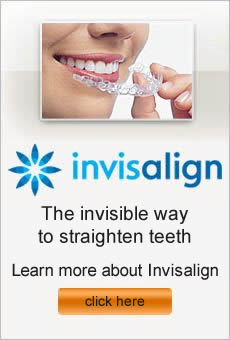Wearing braces on your teeth can be a hassle, so you certainly want to have both a beautiful smile and a healthy mouth at the end of your treatment. That means you must be diligent about taking care of your teeth while wearing braces, so that you don’t develop cavities in the process. If you are a braces patient, you should know the hazards that increase your risk for cavities, as well as how to avoid getting them.
Cavities
Cavities result when plaque accumulates on your teeth and gums. Acid from the plaque develops holes in your teeth, and these cavities start out small but can grow into big problems. Small cavities may go unnoticed, but as they progress it can cause pain and tooth sensitivity.
Higher risk
Braces do not cause cavities, but patients wearing braces are at higher risk for developing them. This is due to the increased amount of food that gets caught in your teeth and wires. When bacteria attacks the food debris, it causes plaque buildup and higher chances of cavity formation as well as gum disease.
Cavity free
Before beginning orthodontic treatment, see your dentist for a full examination of your mouth to make sure no cavities are present. If so, the cavities need to be treated prior to any orthodontic work. Once you are cavity-free, braces may be placed on your teeth.
Avoiding cavities
Here are some tips to avoid cavities while you wear braces:
• Brush after each meal and snacks.
• Floss every day, even though it can be tricky around wires. Use flossers or other tools your orthodontist suggests to help make flossing easier.
• Use a mouthwash to combat bacteria left in your mouth.
• Some patients like using oral irrigators like waterpik to cleanse their mouth and wash away food particles.
• Limit the amount of sugar you eat and drink because it increases your risks for tooth decay.
You may not even realize it, but it’s possible that you are grinding your teeth during the day and especially while sleeping at night. Teeth grinding, also called bruxism, is often a subconscious behavior which places unusual force on your teeth and jaw. It is smart to know the signs to help you recognize if you are grinding your teeth, and what to do if you do have symptoms.
What are the symptoms?
Some people may experience only one or two symptoms, and others may encounter many problems from teeth grinding. Some common signs include:
• Headaches
• Sore jaw or facial muscles
• Earaches
• Muscle tightness or pain in the morning after sleeping
• Stiff or painful shoulders
• Clicking or popping sounds when you open or close your mouth
• Difficulty opening or moving your jaw
What are the consequences?
Teeth grinding can have both short and long-term effects on your health. If you begin to experience symptoms and ignore them, the likelihood of long-term consequences rises. Your teeth may become worn down and crack, which may require more complex and costly dental treatments in the future. Also, your teeth can become overly sensitive because of nerve endings becoming exposed through wear. Pain is another outcome of teeth grinding, and sometimes temporomandibular joint (TMJ) disorder develops.
Is there treatment for it?
Visit your dentist if you notice symptoms, and you may be able to determine together what is causing your bruxism. This bad habit is often linked to anxiety, so limiting stress in your life as much as possible may help. If teeth grinding continues, your dentist may suggest you wear a mouth guard that helps prevent grinding movements. Counseling, physical therapy, and muscle relaxants are sometimes also recommended.
Sherman Oaks Orthodontics
As a parent, you want your child to have the healthiest teeth possible. Here are some tips for you to consider as you strive to help your child achieve this oral health goal.
Teach oral hygiene
Helping your children take care of their teeth should start at a very early age, so that proper hygiene habits are learned and practiced throughout life. Begin brushing their gums with a soft toothbrush even before the first tooth erupts to prevent bacteria from building up. Once your child is old enough to brush, allow them to do it with supervision until about age eight. Also teach your child to floss properly as part of a daily dental care routine.
Choose the right toothpaste
Look for the key ingredient of fluoride in toothpaste, which helps fight bacteria and plaque. When your child is young, supervise the use of fluoride toothpaste so that none is swallowed.
Visit the dentist
Begin taking your child for dental visits around their first birthday, and continue with regular checkups twice a year. Early dental visits help your child become comfortable with the process, and allow the dentist to watch for oral health problems so that they can be treated as soon as possible.
Avoid bedtime bottles
Do not give your child bottles filled with milk, fruit juice, or soda at bedtime. The sugars in these drinks can harm teeth and cause decay, and prolonged exposure to them such as overnight makes it even more hazardous.
Consider sealants
Ask your dentist about applying sealants to your child’s teeth in order to help prevent decay and cavities. Usually applied by your dentist to the chewing surfaces of back teeth, sealants help keep food and bacteria out of areas where decay most often occurs. Sealants are a painless way to help protect your child’s teeth.
Pregnancy brings many kinds of excitement and joy to a mother’s life, but gum problems aren’t one of them. Pregnancy gingivitis not only causes gum trouble, it can also lead to higher risks for preterm labor and problems with the newborn baby. If you are pregnant and notice swelling or inflammation of your gums, you might have pregnancy gingivitis. It results from plaque buildup that irritates your gums, and can harbor bacteria that gets into your body. The bacteria can travel to your uterus and affect your pregnancy and unborn child. How can you avoid pregnancy gingivitis?
Oral hygiene
Brush and floss your teeth properly. Try to brush after all meals and snacks, especially those high in sugars or starches. See your dentist for frequent cleanings, aiming for two to three times during your pregnancy. This will remove more plaque from your teeth that you can at home, serving to lower your risk for plaque buildup.
Education
Consult your dentist before, during, and after your pregnancy. You will learn how to best care for your mouth, and what to watch for in case a problem does arise.
Nutrition
Maintaining a healthy diet during pregnancy will not only benefit your overall health and that of the baby, but will also limit your sugar intake which promotes plaque formation.
Dental care
Try to have dental procedures performed before you become pregnant. Some emergency procedures are safe during pregnancy, but it is best to have treatment done before pregnancy.
Bacteria control
Avoid sharing food and utensils so that you don’t transfer bacteria from person to person. Your goal is to limit the amount of bacteria in your mouth as much as possible.
Xylitol gum
Chewing sugarless gum promotes saliva, which help equalize the acids in your mouth and fight plaque buildup. The ingredient xylitol has been shown to help prevent bacteria from being able to stick on your teeth, therefore fighting tooth decay.
Orthodontist Burbank CA
It’s not unusual for a portion of your braces to become loose at some point during treatment. Whether it’s a wire or a bracket or some other piece, it is not likely to go unnoticed. Loose pieces can poke the insides of your mouth, or affect your eating or speech.
The most frequent reasons for your braces becoming loose include:
• eating foods from the restricted list that your orthodontist provided
• a poor bond between the tooth and the bracket
• bad habits like biting your fingernails or chewing ice
• mouth trauma or injury
• change in your bite
Contact your orthodontist
The first thing you should do is discuss the problem with your orthodontist’s staff. The orthodontist may be able to recommend a temporary fix until your appointment. If an injury caused the problem, get help as soon as possible so that your orthodontist can evaluate the damage.
Common issues:
• If a bracket or wire is poking you and causing discomfort, place a piece of orthodontic wax over the item as needed. If you don’t have any wax, try using a piece of sugarless gum instead.
• If the small rubber elastic around a bracket has come off, try to avoid disturbing the bracket or touching it with your tongue.
• If something is extremely loose, remember that there is a risk of accidentally swallowing it. See your orthodontist if you feel that this might happen.



